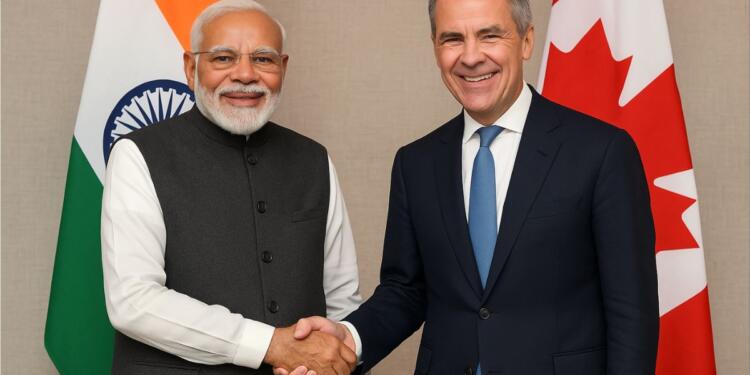With Prime Minister Narendra Modi set to attend the G7 summit in Kananaskis from June 15-17, Alberta, at the invitation of Canadian Prime Minister Mark Carney, Faisal Ahmed, trade and Geostrategic expert and also a professor of International Business and Geopolitics at FORE School of Management in New Delhi, shares various aspects of PM Modi’s visit to Canada.
Faisal discusses the potential revival of interim trade agreement talks between India and Canada during PM Modi’s visit while also Canada PM Mark Carney may opt to adopt diplomatic approach to address the Khalistani issue with New Delhi. He also emphasized that PM Modi’s decision of attending the G7 summit signals a shift toward ‘strategic rebalancing’, potentially reviving trade talks and improving India-Canada relations strained over Khalistani issues.”
Considering the growing clout of India across the world, Canada PM Mark Carney may opt for a diplomatic dialogue to resolve Khalistan issue and revive the ties between both the countries that sharply deteriorated following the June 2023 killing of Hardeep Singh Nijjar, a Canadian citizen linked to the Khalistan Tiger Force, a group labeled as a terrorist organization by India. Nijjar was gunned down outside a Sikh temple in British Columbia. The situation escalated when the then Prime Minister Justin Trudeau alleged that Indian operatives may have played a role in the assassination. India vehemently denied the claims, calling them unfounded and politically charged. The result was a full-blown diplomatic standoff: both nations expelled senior diplomats, froze trade discussions, and withdrew from bilateral dialogues. It is being speculated that when both the leaders hold bilateral talks, New Delhi may urge Ottawa to act against Khalistani elements in Canada.
Below are the excerpts of the interview:
Q What is the significance of Canadian Prime Minister Mark Carney inviting Prime Minister Modi for the G7 summit?
It will be a historic visit amid the strained ties between India and Canada. The visit not only solicits India’s voice at G7 summit but also seeks to strengthen the bilateral ties with Canada. In fact, the killing of Nijjar has to do with the inadequacy of law enforcement and internal security in Canada, and blaming India for this was a wrong diplomatic posturing. Carney’s invitation to Modi at least makes it clear that he wants dialogue with India, and that he recognises India’s strong role in international trade and global security.
Q. Could this invitation signal a potential improvement in the strained bilateral relations between Canada and India under Trudeau’s leadership?
Yes, of course. This invitation is a step toward de-escalation of conflict, and would possibly open up a new era characterised by rapprochement between the two countries. Deep-rooted and long-standing issues need to be put onto a systematic process of dialogue and conflict resolution.
Q. What impact could Prime Minister Modi’s attendance have on Canada–India relations and broader diplomatic ties?
The decision by Modi to attend the G7 summit signals a shift toward ‘strategic rebalancing’, one that not only determines global aspirations for India but also lays new avenues for bilateral cooperation in several sectors. it also indicates that both the countries are ready for a dialogue based on mutual trust. Moreover, Modi would firmly assert on ‘strategic autonomy’.
Q. As Canadian opposition leader Pierre Poilievre said it is need to work with India on trade and security, what do you think of the impact of PM Modi’s visit to Canada on trade ties.?
Poilievre stated that it is essential for the Canadian government to work on the security issues. In fact, Modi’s presence could also revive talks on an ongoing interim trade agreement negotiations between India and Canada. It would help create possibilities for a robust India-Canada free trade agreement. Moreover, global and regional security remains a key concern for G7 countries. Therefore, Modi’s say is very crucial and decisive for the G7 countries in ensuring security not only in Eurasia and the Middle East, but also in the Indo-Pacific, and particularly in the Indian Ocean and across the South China Sea.
5. Will PM Mark Carney act on Khalistani elements within Canada and the 26 extradition requests it has submitted to Ottawa over the past decade. Many of these requests involve individuals accused of terrorism or extremist violence, including known figures connected to the Khalistan movement.
Carney would like to handle it diplomatically so that the issue does not overshadows the G7 main agenda. In fact, whether it is extradition request from India or it pertains to Trudeau’s stern stand, Carney would be approaching this issue more pragmatically as he is keen to resolve it by initiating a series of negotiations with a positive frame of mind.
























